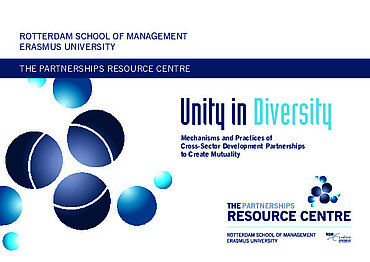Abstract
Mechanisms and Practices of Cross-Sector Development Partnerships to Create Mutuality The value of cross-sector partnerships derives from an increasing level of diversity, since it translates into wider range of available resources and capabilities. However it also implies contrasting logics and interests, conflicting values, diverging expectations and approaches to value creation. Partner organisations’ inherent diversity may then become a hindrance if it stands in the way of creating synergies across partners. Based on seven cases of cross-sector partnerships with the private sector facilitated by the Embassy of the Kingdom of the Netherlands in Colombia, this research explores how these partnerships have dealt with organisational diversity in practice. The findings suggest that achieving a degree of mutuality provides partnerships with the potential for creating collective and individual value while preserving the diversity that characterizes them. Mutuality refers to a reciprocal relationship between two or more organisations. Partners work towards reaching a joint objective but it must still be acknowledged that each partner has potentially differing interests. This booklet introduces a model that depicts key mechanisms to facilitate mutuality, as well as practices that partners can develop to put such mechanisms into action. Four of these mechanisms, namely: coordination, accountability, partnership collective identity and transparency, are then explored in more detail to show how partnerships can achieve higher levels of mutuality in practice. Pfisterer, S., Payandeh, N. (2014). Unity in Diversity. Mechanisms and Practices of Cross- Sector Development Partnerships to Create Mutuality. The Partnerships Resource Centre: Rotterdam.
